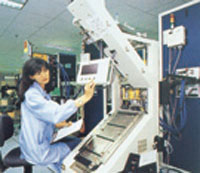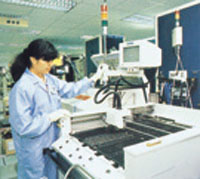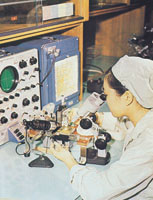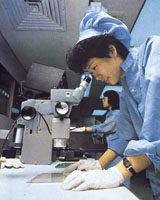| Electronics
Hong Kong's electronics industry
began in the late 1950's with a small number of factories
assembling radios using components imported from Japan.
Given the latest development of micro-electronics
and micro-processor technology, and the continous
expansion of the market, Hong Kong's electronics industry,
especially in the past decade, has been growing rapidly,
with an annual compound growth rate of 24%.
At present, the electronics industry is the second
largest export industry, contributing to nearly one
third of Hong Kong's total domestic exports.
At present, the United States
and the Chinese Mainland are the largest markets for
Hong Kong's electronic products, followed by Japan,
Singapore, Germany and the United Kingdom. Finished
goods constitute about half of Hong Kong's electronics
exports, the majority are consumer electronics for
domestic and personal use, such as audio-visual equipment,
electronic toys, games and related articles.
Hong Kong is the world's largest exporter of calculators,
radios and telephone sets. Moreover, Hong Kong
exports a variety of computer products, such as desktop,
notebook and palm-top computers and CD-ROM drives,
as well as telecommunications products like cordless
phones and pagers. Regarding parts and components,
the largest export item is parts and accessories for
computers.
There are now 908 electronics
factories in Hong Kong, with an employment size of
27,304 workers and an export volume of HK$39,385 million
in 1999.
| |
|
 |
| Printed circuit boards, packed
with integrated circuits and other components,
are prepared for fitting into such products
as calculators, microcomputers and telephones. |
|
The manufacture of circuit
boards & electric components requires total
precision. At each stage of production,
workers have to inspect the product carefully
under the microscope to ensure it is free from
defects. |
|
|


Technicians at work are checking and testing
semi-conductors, an important electronic component
in the manufacture of computers and consumer products.

The industrial
diversification has opened up new markets for the
territory's products throughout the world. Now
Hong Kong people can claim to produce everything from
a transistor to a thimble in factories equipped with
the latest scientific aids.

A large,
young workforce attracts overseas and local industrialists
to set up factories in the new town, such as this
manufacturer of liquid crystal displays.
|



